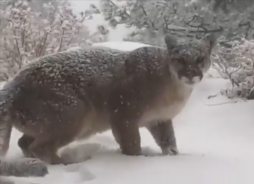Now that snow coats the ground and temperatures hover near freezing, mountain lions will begin to venture close to human development, Boulder officials said in a news release.
During the winter months, the apex predators – meaning top of the food chain – head to lower elevations in search of food, Boulder spokeswoman Cate Stanek said in a release.
Mountain lion attacks on people and pets are relatively rare but they do happen. A lion clawed one man in Montezuma County in late February. Around that time state wildlife officials also relocated another lion out of a Boulder neighborhood last February after multiple attacks on pets had been reported.
The predators are territorial and solitary so generally only a single lion lives within its given territory, Stanek said. So when one leaves its home another tends to take it over.
“Because of this, removing or relocating lions observed in the city does not reduce potential conflict,” she said.
Instead, the best thing to do is to be aware of the risks and stay alert. Risk to people is “extremely low,” Stanek said.
If you encounter a mountain lion, don’t approach it, Stanek said. They prefer to avoid conflict, so be sure to give them space to escape. Speak calmly but firmly to the lion and either stop or slowly back away if you can. Try to make yourself appear larger by raising your arms or opening your jacket.
“Running may stimulate a lion’s instinct to chase and attack,” she said. “Face the lion and stand upright.”
If you’re trying to discourage lions from coming onto your property, install outdoor lights and avoid leaving your pets or children outside and unattended, especially during the evening or early morning hours, Stanek said. Also remove any potential food sources for pets or livestock.
Human and mountain lion encounters have increased in recent years largely due to more people moving into their habitat, according to Colorado Parks and Wildlife. That means more people are out hiking and exploring the wilderness. Plus, deer populations are increasing, providing more food for mountain lions to reproduce more often.
If you encounter a mountain lion you can report the sighting to Colorado Parks and Wildlife by calling their headquarters at 303-297-1192. Additional information is available online at cpw.state.co.us.
Source: Read Full Article
